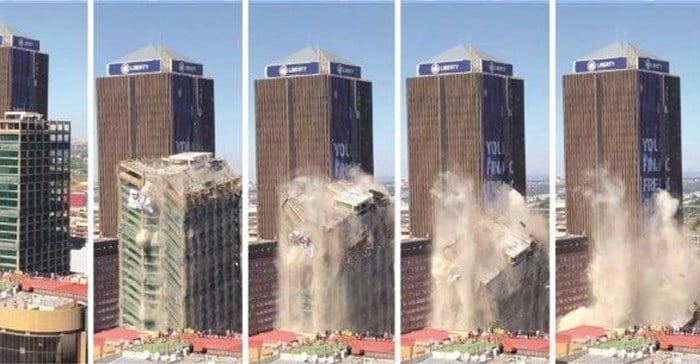
Ageing structures may require significant investment in terms or resources with regard to maintenance – resources that would generally have been available for ongoing operations. In addition, ageing structures may quickly become hazardous, adding more risk to redundant facilities.
“Our approach to demolition projects has always been from the point of view of adhering to international best practice,” says Kate Bester, Jet Demolition contracts manager.
It depends on determining the single method best suited to the project at hand. In some instances, explosives will be called for. For example, the 108-m-high, 31-storey Bank of Lisbon building in central Johannesburg Central is the tallest steel reinforced concrete-frame building ever imploded by the company. A total of 914kg of conventional mining and civil engineering explosive was used in the implosion on 24 November 2019, with 2,363 separate charges individually timed and perfectly sequenced in accordance with the implosion design.
“Typically, we will only consider explosive demolition techniques in areas where mechanical methods are not appropriate, or where the confines of the site do not allow for alternative approaches,” she says.
A controlled implosion was chosen in instance because the building had been damaged in a previous fire, which raised safety concerns about the integrity of the structure.
Despite acknowledging this as its crowning achievement to date, Bester elaborates: “Every single time we set a particularly challenging structure safely to ground, that same feeling of elation is shared by our teams and clients. Demolition is an industry that is very difficult to compare to any other – every day has the potential to be the best you’ve ever had, whether it involves receiving an international award, or just a pat on the back from a client who witnessed a tricky directional drop.”
The Covid-19 pandemic has had a major impact on what is a very hands-on industry due to the nature of the work undertaken, in direct contrast to the social distancing and related regulations now mandatory in construction and related sectors. There is a concerted international drive to embrace remote-working and automated systems to limit the number of personnel directly interfacing with one another.
“Although there are significant developments in industry-specific equipment to promote a more automated approach, we are a long way off from replacing experienced and skilled industry professionals. There is a definite shift to embracing assorted digital and technological tools, for example conducting virtual site visits, but these tools are only able to enhance current work practices, not necessarily to replace them,” says Bester.